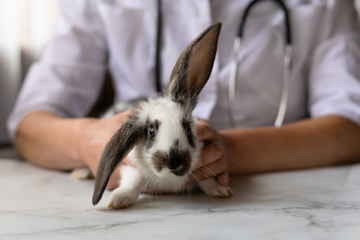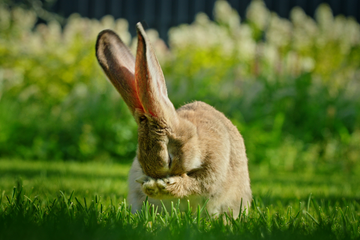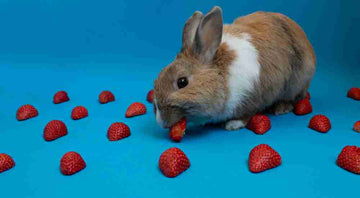Rabbit Vaccination Schedule: A Simple Guide
Rabbits are curious, playful, and full of personality. But if your lively bunny suddenly starts hiding or acting off, it could be a sign that something deeper is happening. Whether it's illness, stress, or even seasonal changes, rabbits are experts at keeping their struggles quiet.
Click Here to Shop Rabbit Products.

Understanding the root cause of your rabbit's behavior isn't always easy, but it's critical to their well-being. Let's explore eight common reasons your bunny might be hiding—and how to help them feel safe and healthy again.
1. Feeling Under the Weather
When a normally social rabbit starts spending more time in hiding, illness should be one of the first things to consider. Unlike dogs or cats, rabbits don't make it obvious when they're not feeling well. In the wild, weakness makes them a target—so even domesticated rabbits instinctively hide pain or discomfort.
Common health issues include dental problems, GI stasis, ear infections, and mites. A rabbit with a painful tooth might avoid food and retreat to a quiet corner. GI stasis, a potentially life-threatening condition, can also trigger hiding behaviors.
What to Do: Don't wait to see if things improve on their own. Any sudden behavioral shift should prompt a check-up. A rabbit-savvy vet can catch subtle signs and provide treatment before things worsen.
2. Stress and Anxiety
Rabbits are sensitive animals that crave routine and calm. Any disruption to their usual environment—like loud noises, a new pet, or a house move—can send them into hiding. Even rearranging furniture or changing the scent of the home can make them uneasy.

Stress doesn't just affect behavior; it also weakens their immune system. That's why it's important to identify and remove stressors before they take a toll on your bunny's health.
What to Do: Maintain a predictable environment. Give your bunny a familiar space to retreat to, and limit interactions during periods of stress. Soft lighting, gentle voices, and a steady routine go a long way in making them feel secure.
3. Feeling Threatened
Rabbits are prey animals through and through. If they perceive a threat—whether it's real or just a vacuum cleaner—they may dart under furniture or into a hidey hole. This response is instinctual and hardwired for survival.
Harmless pets, like a curious dog or cat, can cause a rabbit to retreat. Sudden movements, loud footsteps, or strangers in the house can all contribute to their sense of danger.
What to Do: Provide your rabbit with multiple hiding spots in their enclosure and around your home. Limit loud noise and keep other pets at a respectful distance. Always approach your bunny calmly, never from above like a predator might.
4. Hormonal Changes
If your rabbit hasn't been spayed or neutered, hormones may be driving their behavior. Intact females may become territorial or aggressive, especially around perceived nesting sites. Males can become more skittish or dominant, depending on personality and environment.
Hiding can be part of this hormonal behavior—especially if they're looking to claim space or avoid interaction due to mood swings.
What to Do: Spaying or neutering your rabbit not only helps reduce these behaviors but also supports their long-term health. It can prevent reproductive cancers and reduce unwanted behaviors like urine spraying or aggression. Learn more from the Rabbit Welfare Association's guide to neutering.
5. Molting
Molting happens a few times a year, and it's not always comfortable for your bunny. Shedding fur can cause itchiness, stress, and even temporary digestive problems if too much fur is ingested. Some rabbits get moody or withdrawn during this time, choosing to hide and groom themselves more often.
It's also worth noting that excessive molting could indicate a health issue or poor diet, so monitor how frequently and severely your rabbit molts.
What to Do: Brush your rabbit regularly to help manage the shedding. A good grooming session can be a bonding experience and help prevent hairballs. If you notice bald patches or skin irritation, schedule a vet visit.
6. Temperature Sensitivity
Rabbits have a low tolerance for extreme temperatures. If your house becomes too hot, especially above 80°F (27°C), they'll search for cooler spots to escape the heat. On the flip side, cold drafts or chilly floors might make them seek warmth and comfort in cozy hiding spots.
They don't sweat like humans and can overheat quickly, making it essential to monitor room temperature, especially in the summer months.
What to Do: Keep your rabbit’s environment between 60°F and 70°F. Use ceramic tiles or frozen water bottles wrapped in towels for cooling. For winter, offer fleece blankets and ensure they're not exposed to cold drafts.
7. Socialization and Trust Building
New rabbits or those with a history of trauma may simply not feel safe yet. Hiding is often their default response until they build trust with their humans. Even confident rabbits need alone time now and then.
This behavior is more common in rescued rabbits or those not handled much. It doesn't mean they don't like you—it just means they're still learning how to feel safe.
What to Do: Spend time sitting quietly near your rabbit without trying to touch them. Offer treats and speak gently. Use positive reinforcement to reward brave behavior. Over time, your bunny will associate you with safety and start coming out more often. Check out our guide on building trust with your rabbit for more ideas.
8. Old Age
Senior rabbits slow down naturally. They may nap more, move less, and find secluded spots for rest. Age-related issues like arthritis can make them less eager to play or interact, and they may start to prefer quieter, softer environments.
Older bunnies still need mental stimulation, but the pace and intensity should match their physical condition.
What to Do: Offer gentle enrichment, such as low platforms, soft bedding, and reachable toys. Talk to your vet about dietary changes for aging rabbits. A proper diet rich in fiber becomes even more important as your rabbit grows older.
Understanding the Importance of a Rabbit Vaccination Schedule
While behavioral changes like hiding can be linked to stress or aging, health issues are often the bigger concern. One critical step in protecting your rabbit is staying on top of their rabbit vaccination schedule. In many countries, vaccinations are essential to guard against deadly diseases like myxomatosis and Rabbit Hemorrhagic Disease Virus (RHDV).
These diseases spread easily through insect bites, direct contact, or contaminated food. And they're almost always fatal if your rabbit isn't vaccinated. That's why some regions, especially in the UK and parts of Europe, consider rabbit vaccines a standard part of care.
In the U.S., vaccines for rabbits aren't as commonly administered, but that is changing. In 2020, the USDA approved a vaccine for RHDV2 after outbreaks in multiple states. Ask your exotic vet whether your rabbit needs this protection, especially if they go outside or live in a high-risk area.
Which Vaccines Should You Ask Your Vet About?
Myxomatosis: A severe viral infection spread by fleas and mosquitoes. It causes swelling and blindness and is usually fatal without vaccination.
RHDV1 & RHDV2: These affect the liver and cause internal bleeding. Outbreaks can spread quickly among rabbit populations.
What to Do: Talk to a rabbit-savvy vet about a proper rabbit vaccination schedule for your area. Even indoor-only rabbits may be at risk, and timely vaccines can mean the difference between life and death. The House Rabbit Society is a reliable source for updates on U.S. vaccination recommendations.
How to Stay on Track with Your Rabbit Vaccination Schedule
Establishing a routine with your rabbit's vet is the best way to stay current. Most vaccinations need yearly boosters, and your vet will help you develop a vaccination calendar tailored to your rabbit's age, lifestyle, and health. It's also wise to keep written records or use a digital reminder app to avoid missing doses.
If you adopt a rabbit from a rescue, ask if they've already received vaccines. Shelters often vaccinate incoming animals, especially in areas with known outbreaks. Still, you'll need to follow up with booster shots to keep your bunny protected long-term.
What to Do: Mark your calendar and create a care checklist. Add annual vet visits to it—even if your rabbit looks healthy, they are crucial for catching hidden issues early. Include dental checks, weight monitoring, and discussions about potential vaccine updates.
Does Every Rabbit Need Vaccines?
This depends heavily on where you live. In the United Kingdom, rabbit vaccinations are strongly encouraged due to the risk of myxomatosis and RHDV. In the United States, the decision is more regional. If you're in a state like California, Arizona, or Texas—where RHDV2 outbreaks have occurred—your rabbit could be at real risk even if kept indoors.
Insects can fly through open windows, and viruses can travel on your shoes or produce. If your rabbit goes outside or you attend rabbit shows or meetups, vaccines are highly recommended. It's not a matter of overprotecting—it's being smart about prevention.
What to Do: Have a conversation with your vet about the risks in your area. You can also check state or local agriculture department websites for outbreak updates. The USDA's page on RHDV2 is updated with outbreak maps and vaccine availability in the U.S.
Other Health Considerations to Watch Alongside Vaccines
Vaccines are only part of a well-rounded rabbit care plan. Dental issues, digestive problems, and parasites are common in pet rabbits. Combining your rabbit vaccination schedule with other preventative health steps is key.

Keep your rabbit's living area clean and well-ventilated. Provide unlimited hay, such as Medium Timothy Hay, to support digestion and dental health. Monitor their poop daily—it can tell you a lot about what's going on internally.
Behavior changes like hiding are often your first clue. Combine that awareness with proactive vet care and vaccines, and you'll give your bunny the best shot at a long, healthy life.
How to Tell if a Vaccine Is Causing a Reaction
Most rabbits handle vaccinations just fine. Occasionally, mild side effects like sleepiness, a lump at the injection site, or decreased daily appetite can occur. Severe reactions are rare but can include swelling, respiratory issues, or high fever.
What to Do: Monitor your rabbit closely for 24-48 hours after their shot. Call your vet immediately if anything seems off—especially if they stop eating or seem extremely lethargic. It's always better to err on the side of caution. Mild reactions usually resolve quickly, but serious ones need prompt medical attention.
When Is the Best Time to Vaccinate a Rabbit?
Most rabbits can receive their first round of vaccinations at around 5-7 weeks old, depending on the specific vaccine and your vet's protocol. Booster shots are then given yearly. Some vaccines are combined into one injection, while others may require separate appointments.
If you're adopting an older rabbit who hasn't been vaccinated, it's never too late to start. Healthy adult rabbits benefit just as much from disease protection as younger ones.
What to Do: Schedule an initial wellness exam as soon as you bring your bunny home. Use this time to establish their health baseline and start the vaccination schedule. Your vet will recommend the right approach based on your rabbit's age and background.
Creating a Healthy Environment Beyond Vaccines
While vaccines prevent deadly diseases, your rabbit's daily environment plays an even bigger role in overall wellness. Make sure they have:
A hay-rich diet: Hay is essential for digestion and teeth health. Fresh hay should make up 80-90% of their diet. Learn why in our Hay Is for Rabbits guide.
Clean housing: Spot clean litter boxes daily and do full cleanings weekly. Use rabbit-safe cleaners and avoid scented products that can stress their sensitive respiratory system.
Safe exercise space: Rabbits need 3–5 hours of daily exercise. Bunny-proof any area they access to prevent chewing hazards and ensure they have room to explore.
Companionship: Many rabbits thrive with a bonded bunny buddy. If solo, be sure you provide plenty of social interaction.
Vaccines are important, but don't replace the daily care and emotional enrichment your rabbit needs to stay healthy and happy.
Final Thoughts: Don't Let the Quiet Ones Go Unnoticed
Rabbits may not bark, meow, or whine when unwell—but that doesn't mean they're fine. Hiding is one of the clearest signs that something's not right. It's worth paying attention to those quiet moments, whether it's stress, illness, or a simple molt.
One of the best ways to protect your rabbit's long-term health is by working with a rabbit-savvy vet to build a complete care plan. That includes understanding the right rabbit vaccination schedule for your area, scheduling annual wellness exams, and keeping their environment calm and predictable.
Every bunny is different, but they all deserve a safe and secure home, good food, and preventative care, including vaccination. With extra attention and planning, your rabbit will stay healthy—and continue to bring joy for many years.
Key Takeaways
Hiding is a rabbit's natural response to stress, illness, or environmental changes. Track these behaviors and talk to your vet if anything seems off.
Vaccines like RHDV2 and Myxomatosis are essential in many areas. Ask your vet about the right rabbit vaccination schedule for your location and lifestyle.
A healthy diet, clean space, and regular vet check-ups are as important as vaccines for long-term rabbit health.
At Rabbit Hole Hay, we're passionate about helping you care for your furry family members. But remember—this blog is for educational purposes only. Always consult a qualified veterinarian for accurate diagnosis and treatment if you're worried about your rabbit's health or behavior.

Should You Get Rabbit Pet Insurance? Here's Everything You Need to Know

"Why Is My Rabbit Licking Her Own Pee?"









